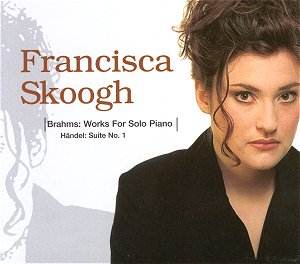It seems slightly eccentric to begin a disc entitled
"Brahms: Works for Solo Piano’ with a Harpsichord Suite by Handel
(albeit played on the piano). However, this is not so daft as it sounds,
for the suite contains the theme on which Brahms based his great op.24
Variations of 1861, which themselves occupy tracks 10 to 13 of this
CD.
Francisca Skoogh is a whole-hearted player; not for
her any suspicion that Brahms’s piano music might be beyond the reach,
let alone the power, of a female performer! Indeed, she sometimes becomes
almost too aggressive and physical at times, though her instinct is,
I feel, right; i.e. that Brahms should not be approached with that slightly
bland and restrained tone some players adopt. She has a technique that
allows her to deliver this hugely demanding music flawlessly, which
is in itself an achievement. She also understands well the inner tensions
– rhythmical and harmonic – which make this composer one of the most
fascinating and, strangely, forward-looking of the 19th century.
She builds the larger pieces, especially the Handel Variations, with
a sure sense of their long-term structure, and characterises everything
imaginatively along the way. The shorter works of op.119 – shorter perhaps
but no less complex – are given equally insightful readings.
The frustrating downside here is a recording that is
so close that the listener quickly becomes aware of mechanical noises
from within the piano, mainly the sound of the sustaining pedal coming
on and off. It’s not one of those barely audible things – this is really
very distracting, and it’s just such a pity that Skoogh’s fine playing
is marred in this way. I do appreciate how difficult microphone placing
can be for the piano; but this is a real problem, and certainly detracted
from my pleasure.
That said, there is much to admire, and I’m sure we
shall hear a great deal more from this gifted young (29) Swedish pianist.
The Handel Suite is placed at the beginning of the disc, and if you
can accept Baroque keyboard music played on the piano (and in this context
you really should, because that is how Brahms would have made its acquaintance)
then you’ll find this a musically satisfying and stylish reading. The
op.21 Variations on a fascinating 18-bar theme of Brahms’s own invention
are given an impressive and convincing interpretation; but of course,
the greatest interest in the programme lies in the huge Handel Variations
of op.24. Skoogh really has the measure of this. Having presented the
theme exactly as it appears in the original Handel, she shapes and paces
the successive variations and groups of variations superbly.
Listen to the crisp fanfares of Variation 7 (reminding me that Edmund
Rubbra made a splendid job of orchestrating the work); or Variation
10 with its extreme changes of register and dynamic, looking forward
to Rachmaninov’s ‘Paganini Rhapsody’; or the suave Variation 11, with
its gentle counterpoint blossoming through the texture. But the real
tour de force is the enormous final fugue, which grows to a pounding
climax, with the theme striding in left-hand octaves.
Throughout all this, Skoogh remains in total control
of the overall direction of the work, yet manages to convey strongly
the shifting colours and moods of the music. This is a powerful and
wholly stylish reading. By the way, when the Variations come to an end,
hold your horses! There’s another unscheduled track – track 14 – which
contains the lovely Waltz in Ab as a bonus.
Gwyn Parry-Jones


